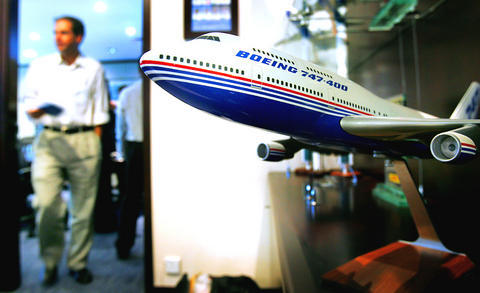Boeing Co said Asia-Pacific airlines will see their air traffic grow 6.3 percent a year over the next 20 years, leading them to spend more than US$1 trillion on new commercial jets to handle the increase.
Global air traffic, in comparison, will grow about 5 percent a year from now until 2026, Randy Tinseth, vice president of marketing for Boeing's Seattle-based commercial airplane division, told reporters on Monday in Singapore.
"Within the Asia-Pacific market we see the strongest growth," Tinseth said.

PHOTO: AP
"This is a market that continues to liberalize, this is a market where trade is very strong and this is a market where we have strong cultural connections around the region," he said.
Asia-Pacific airlines are estimated to need about 8,350 new airplanes over the next 20 years -- which will nearly triple the region's fleet, Tinseth said.
Traffic within the Asia-Pacific region is likely to expand 6.7 percent, while domestic air traffic within China is forecast to grow at 9 percent a year.
"China today is still a relatively small market, but by the end of the 20 year period it will be about the same size as the US market today," he said.
Boeing also forecasts 6.7 percent annual growth in long-haul travel between the Asia Pacific and Africa, a relatively new flow, as fuel-efficient twin-aisle jets become more widely used, Tinseth said.
Out of the US$1.02 trillion that Asia-Pacific airlines are forecast to spend on new planes, 53 percent will be for twin-aisle planes that can carry 200 to 400 passengers and 32 percent will be for single-aisle planes that can carry 90 to 240 passengers, Tinseth said.
Regional jets that seat no more than 90 are expected to make up 2 percent. Large aircraft such as the Boeing 747 and rival Airbus' superjumbo A380, which seat more than 400 passengers, will account for 14 percent.

MORE VISITORS: The Tourism Administration said that it is seeing positive prospects in its efforts to expand the tourism market in North America and Europe Taiwan has been ranked as the cheapest place in the world to travel to this year, based on a list recommended by NerdWallet. The San Francisco-based personal finance company said that Taiwan topped the list of 16 nations it chose for budget travelers because US tourists do not need visas and travelers can easily have a good meal for less than US$10. A bus ride in Taipei costs just under US$0.50, while subway rides start at US$0.60, the firm said, adding that public transportation in Taiwan is easy to navigate. The firm also called Taiwan a “food lover’s paradise,” citing inexpensive breakfast stalls

TRADE: A mandatory declaration of origin for manufactured goods bound for the US is to take effect on May 7 to block China from exploiting Taiwan’s trade channels All products manufactured in Taiwan and exported to the US must include a signed declaration of origin starting on May 7, the Bureau of Foreign Trade announced yesterday. US President Donald Trump on April 2 imposed a 32 percent tariff on imports from Taiwan, but one week later announced a 90-day pause on its implementation. However, a universal 10 percent tariff was immediately applied to most imports from around the world. On April 12, the Trump administration further exempted computers, smartphones and semiconductors from the new tariffs. In response, President William Lai’s (賴清德) administration has introduced a series of countermeasures to support affected

CROSS-STRAIT: The vast majority of Taiwanese support maintaining the ‘status quo,’ while concern is rising about Beijing’s influence operations More than eight out of 10 Taiwanese reject Beijing’s “one country, two systems” framework for cross-strait relations, according to a survey released by the Mainland Affairs Council (MAC) on Thursday. The MAC’s latest quarterly survey found that 84.4 percent of respondents opposed Beijing’s “one country, two systems” formula for handling cross-strait relations — a figure consistent with past polling. Over the past three years, opposition to the framework has remained high, ranging from a low of 83.6 percent in April 2023 to a peak of 89.6 percent in April last year. In the most recent poll, 82.5 percent also rejected China’s

PLUGGING HOLES: The amendments would bring the legislation in line with systems found in other countries such as Japan and the US, Legislator Chen Kuan-ting said Democratic Progressive Party (DPP) Legislator Chen Kuan-ting (陳冠廷) has proposed amending national security legislation amid a spate of espionage cases. Potential gaps in security vetting procedures for personnel with access to sensitive information prompted him to propose the amendments, which would introduce changes to Article 14 of the Classified National Security Information Protection Act (國家機密保護法), Chen said yesterday. The proposal, which aims to enhance interagency vetting procedures and reduce the risk of classified information leaks, would establish a comprehensive security clearance system in Taiwan, he said. The amendment would require character and loyalty checks for civil servants and intelligence personnel prior to